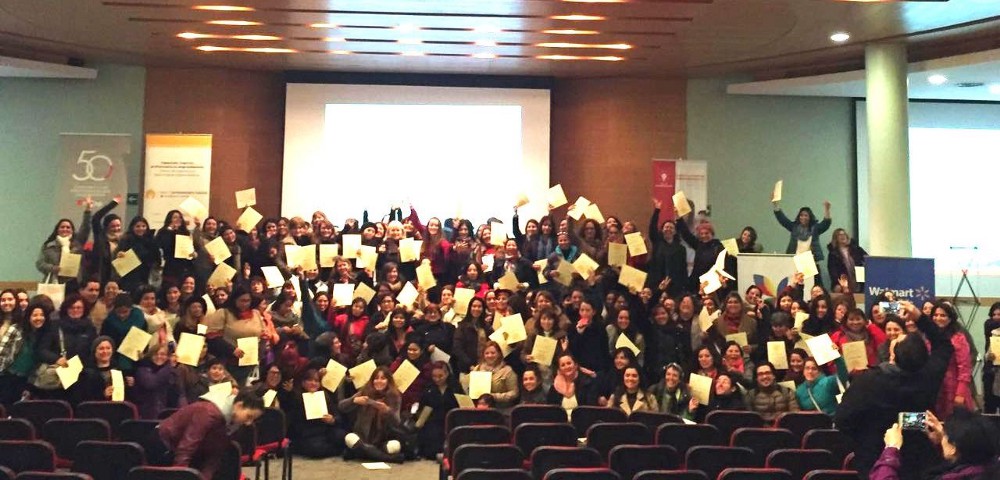A version of this story was originally published on B The Change (bthechange.com).
By Katy Ibsen
Living in the northernmost region of Chile, a 68-year-old woman who spent her life teaching chemistry was let go two years before she was set to retire. Undeterred, she decided to start her own business growing aloe vera plants.
She began exporting products made from her aloe, and when that was going well, she imported a special machine to make art crafts from the skin of the plant, providing work to others in her community. That aloe visionary is Cynthia Anabalón Pérez and her business, Mundo Aloe Vera, has been recognized nationally.
“She has developed so much,” says Fernanda Vicente, co-founder of Mujeres del Pacífico and president of the board of directors. “We share her story with the whole country.”
Identifying the need
A 2018 B Lab Best For The World honoree, Mujeres del Pacífico was founded in 2013 by a group of eight women who had been given the opportunity to travel to different countries, including Silicon Valley in the U.S., to learn about innovation.
“When we came back, we felt that it was unfair because we were a few people who already had access to this information,” co-founder Fernanda Vicente says. “The rest of the women entrepreneurs in Latin America, they didn’t have the same opportunities we had in life or access to all of this priceless information for our companies. So, we decided that it was time to empower women in our region and to give them the same opportunity that we have had.”
Mujeres del Pacífico emerged as the organization to develop and promote female entrepreneurship. The founders identified five gaps that exist among the women in Latin America, keeping them from launching and sustaining successful businesses: knowledge, access to network, invisibility, disconnection with the ecosystem, and little access to financing.
They developed content, training, support, and outreach around these gaps to mobilize female entrepreneurs in the region.
- Knowledge: Women need to be educated to feel empowered. Mujeres created training programs for varying skills and content on how to develop businesses.
- Access to networks: Mujeres makes connections between the women and sales channels or different value chains that they could work with.
- Invisibility: In Latin America, many women are not recognized for the work they have done or the businesses they’ve built . To combat this, Mujeres publicizes success stories like Mundo Aloe Vera. They also promote women entrepreneurs through events so others can learn from their testimonials.
- Disconnection with the ecosystem: Mujeres works with 60 organizations, both public and private, to aid in connecting and facilitating business support to help the small female-owned businesses grow.
- Little access to funding: Most female Latin American entrepreneurs have little access to bank financing, public financing, or venture capital. Mujeres helps to make finance connections.
With its mission to economically empower every woman in Latin America and give them the tools they need to start and grow their businesses, Mujeres has now taken its five educational areas and developed them into an online platform in partnership with IBM’s Watson.
“We have physically worked with 10,000 women in this region, and now we will be able to reach a bigger group,” Vincente says. “We’re thinking about more than 20 million in the future.”

A Mujeres workshop.
Sustainable governance
Mujeres del Pacífico has three sources of funding to sustain its work. Most expansive is a partnership with the public sectors in Chile, Peru, Colombia, and Mexico. As a consultant, Mujeres develops useful training programs for women, an area that needs greater impact within these countries, to grow their presence in business. Mujeres also assists in developing public policy as it relates to women in those regions.
On a smaller scale, Mujeres is funded by one-off programs developed for specific businesses or groups. Typically these organizations can afford to hire Mujeres for their expertise. Sponsorships is the final source of funding.
Governing the organization is a board of directors and three of the founders serving in varying daily roles: content development, executive management and administration, and compliance. Mujeres also relies on its representatives from each country for greater outreach and streamlined messaging.
“It’s more like a group structure,” Vicente says. “Our stakeholders are our partners, we work with them. It’s not just impacting them.”
Mujeres’ partners include B Lab, the nonprofit that certifies B Corporations, a certification Mujeres has held since 2015.
Providing the right resources
Mujeres del Pacífico, vigilant in its efforts, has studied its own work not only in the area of working with funding clients, but also with their beneficiaries — the women.
“We have made several studies about the beneficiaries, about the women, so now we know the archetypes of the women we work with,” Vincente says. “We know about the gaps and we know about the tools that they need, and the public sector needs to help the women and serve them better.”
That translates into Mujeres del Pacífico’s current programs in working directly with women.
Over the last two years, the organization has traveled around Chile hosting the Tour of Women Entrepreneurship, an intensive two-day training event in various cities that welcomed upwards of 400 women per event. Mujeres partners with the public sector and area universities on the training to improve women’s mindset on business, and specialists and entrepreneurs share success stories. The tour is now expanding into Peru, Colombia, and Mexico.
“The beautiful thing is that it’s not segmented. The 400 women are from different backgrounds, from different worlds. They are from the rural or poorest places and also from more prestigious places, all at the same event. They connect between themselves at the same time,” Vicente explains. “Because we share knowledge between all kinds of women, that experience that they have is put on the table, it’s very valuable.”
The Mujeres team works to keep up with all of the women they encounter. Many will go on to engage in additional training provided by Mujeres del Pacífico — creating an army of women equipped for business.
“We have fewer competitive advantages. We don’t have as many networks to start businesses. We don’t have as much knowledge to start businesses,” Vicente says. “But still, if you go to the invisible economy, most of it is micro-companies and micro-businesses run by women to meet their needs. That means that women start things because they need it, but they don’t have the tools to be formal. Mujeres provides these tools. We’re professionalizing the entrepreneurs.”
Find all Best For The World honorees and stories on B the Change.





